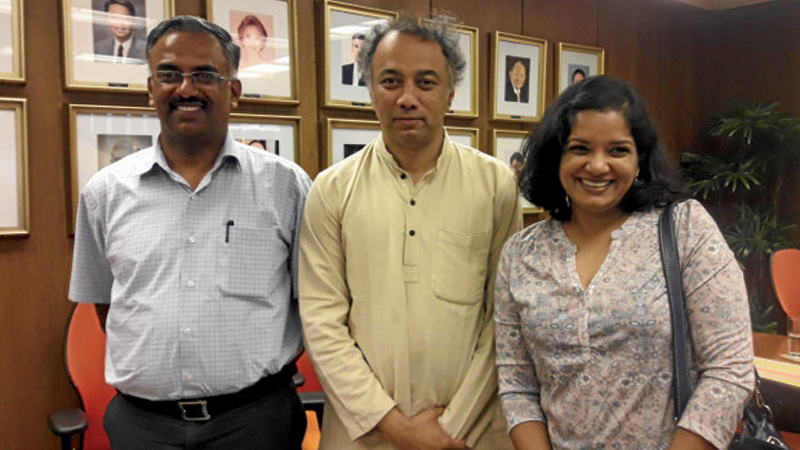
2011 Magsaysay Awardee Harish Hande (center) poses with Selco Technical Advisor Thomas Pullenkav (left), and Selco Fund Head Sarah Alexander at Ramon Magsaysay Center.—YARA LUKMAN
Indian social entrepreneur Harish Hande, recipient of the 2011 Ramon Magsaysay Awards, this month visited Manila to spearhead an energy replication project and a two-day workshop on solar energy.
In an interview at the Ramon Magsaysay Center on Tuesday, the “Father of Affordable Solar Power in India,” who cofounded the social enterprise Solar Electric Light Company (Selco) in 1995, emphasized the importance of local development and inclusive thinking in solving developing countries’ problems.
Hande said the reason why Selco still lives to this day is its philosophy of looking at social, financial and environmental sustainability at the same time. “If any of them is sacrificed, you distort the sustainability of anything,” he said.
Hande, with Selco Technical Advisor Thomas Pullenkav and Selco Fund Head Sarah Alexander, said Selco aims to eradicate poverty through sustainable and renewable energy.
The two-day workshop was held on Wednesday and Thursday at Eugenio Lopez Center in Antipolo City and organized by Ramon Magsaysay Transformative Leadership Institute and Peace and Equity Foundation in partnership with Selco. The workshop was attended by solar energy providers, financing entities, farmer and fisherfolk communities and nongovernment organizations.
“The main idea is to put up projects in Quirino, Cagayan Valley, Visayas and Basilan,” said Manuel Hizon, Ramon Magsaysay Award Foundation communication director.
“The added value is adaptation and solution to climate change with a development perspective,” Hande said. “We can guide the Philippines in learning from the mistakes that we have done in India—like lessons on how to align with shareholders and preserving the mission of your organization at the same time—and we can also look at ways of innovation for the Philippines.”
“The Philippines is an island nation so Filipinos cannot keep on relying on diesel and other types of fossil fuels,” Hande said.
Hande said the vision is to start establishing an ecosystem that encourages rural enterprises in the Philippines. “We need to start treating the poor as partners, not as beneficiaries,” he said.
Alexander clarified that the project they are doing in the Philippines is not a form of franchising but only an expansion of Selco’s concept.
“We are not saying that the Philippines should take the entire Selco model and execute it. It depends on where you are based and your kind of customers,” Alexander said.
The aim is to take parts of the Selco model that make sense for Philippines and to replicate them, Alexander said.

